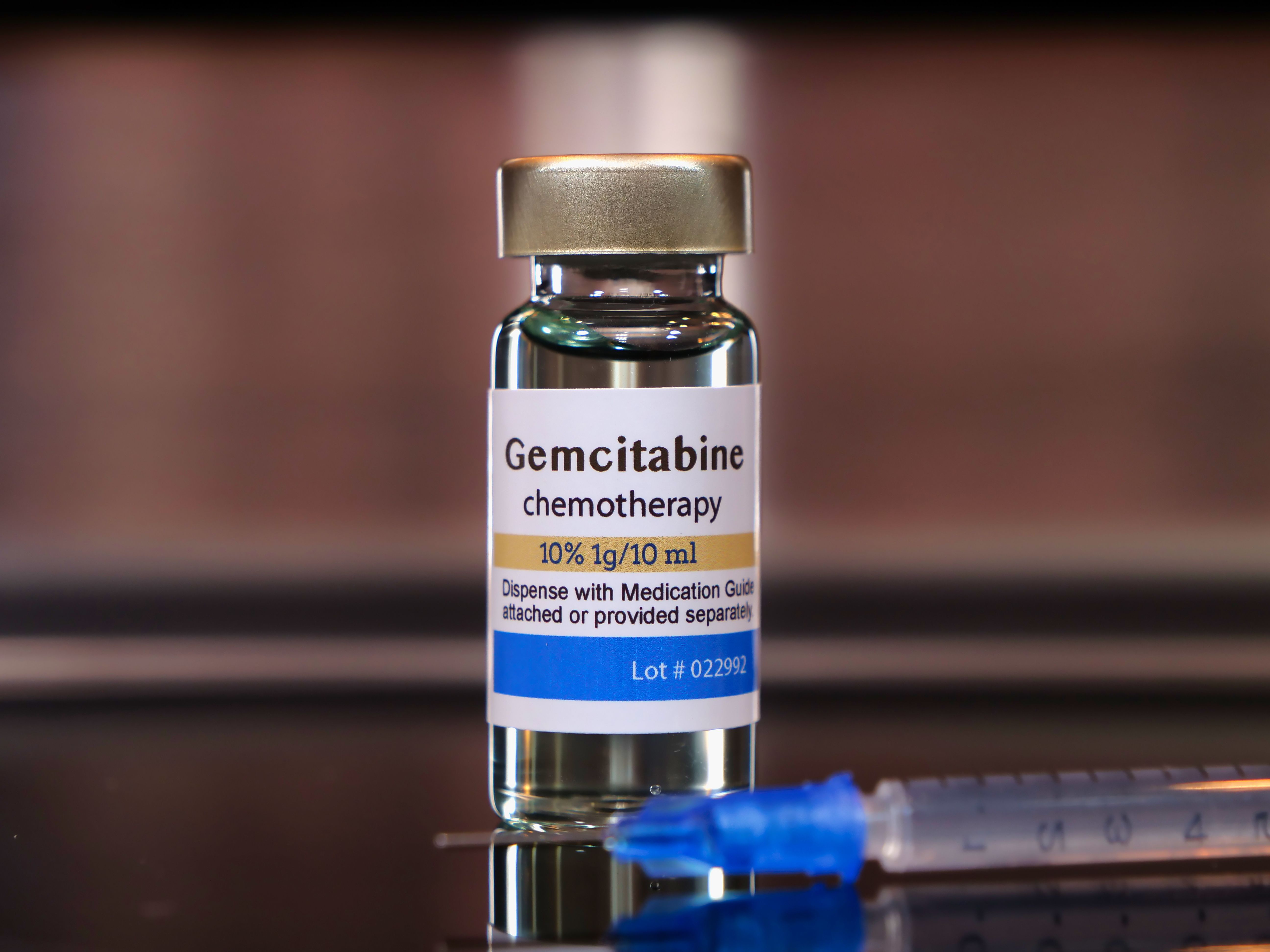- Center on Health Equity & Access
- Clinical
- Health Care Cost
- Health Care Delivery
- Insurance
- Policy
- Technology
- Value-Based Care
TAR-200 Monotherapy Has 82.8% Complete Response Rate in BCG-Unresponsive HR-NMIBC
Updated findings from SunRISe-1 also showed that all but 1 responder achieved complete response within 12 weeks of treatment with the targeted gemcitabine delivery system.
Updated results from SunRISe-1—an ongoing open-label phase 2b study—demonstrated the effectiveness and safety of TAR-200 when used alone in patients with high-risk non-muscle-invasive bladder cancer (HR-NMIBC) who have not responded to Bacillus Calmette-Guérin (BCG) therapy and have carcinoma in situ.1 These patients are also ineligible for or have declined radical cystectomy.
Gemcitabine | Image credit: Bernard Chantal – stock.adobe.com

“Radical cystectomy is a life-changing operation with considerable morbidity and quality of life considerations,” said Joseph Jacob, MD, MS, presenting author and associate professor of urology at Upstate Medical University. “Moreover, there is a 90-day mortality risk of up to 8%. As such, there is a high unmet need for bladder-sparing therapies in this population.”
TAR-200 is a novel targeted release system that delivers gemcitabine to the bladder over time and is inserted using a urinary placement catheter, which typically takes 2 to 3 minutes. Removal of TAR-200 is conducted with a cystoscope, similar to removing a ureteral stent.
The new SunRISe-1 findings were presented at the American Urological Association (AUA) 2024 Annual Meeting. Interim results of the study were previously reported last year at the European Society for Medical Oncology 2023 Congress and the AUA 2023 Annual Meeting, as well as the European Association of Urology 2024 Congress earlier this year.2
In these updated results—with a data cutoff of January 4, 2024—82.8% (95% CI, 70.6%-91.4%) of 85 patients treated with TAR-200 monotherapy achieved a complete response (CR) measured via urine cytology and/or biopsy. Additionally, 86.2% (95% CI, 74.6%-93.9%) of patients in this cohort achieved an investigator-assessed CR. Onset of CR was rapid, with 98% of responses achieved at week 12, when the first disease assessment was conducted.
"The high complete response rate and durability of these responses observed in patients treated with TAR-200 underscores the potential of this treatment approach for patients with BCG-unresponsive HR-NMIBC," Jacob said in a Johnson & Johnson press release.3 "These results address an area of high unmet need for bladder sparing therapies in this patient population."
The dosage in this study involved monotherapy once every 3 weeks for the first 24 weeks, and then once every 12 weeks until week 96. The estimated 6-month CR rate is 75.7% (95% CI, 59.1%-86.3%) and the estimated 12-month CR rate is 61.9% (95% CI, 41.1%-77.1%). Additionally, the estimated 1-year duration of response rate is 74.6% (95% CI, 49.8-88.4), with a median follow-up of 29.9 weeks (range, 14-140) in responders.
The CR rate of the TAR-200 monotherapy was fairly consistent across several patient subgroups, noting different proportions of each demographic.
When stratified by age, the CR rate was 85.7% for those younger than 65, 84.6% for those aged 65 to 74 years, and a slightly lower 77.8% for those aged 75 years and older. While the racial subgroups only included White and other—grouping together Black, Asian, and not reported or unknown—as categories, the CR rate was 87.2% for White patients and 73.7% for the rest. Additionally, female patients had a higher CR rate (92.3%) than male patients (80%), though there were much more men in the study than women, making up 80% of the cohort.
Among those in the cohort, the median age was 71 years (range 40-88) and 32.9% had concurrent papillary disease. Jacob noted during the presentation that 41 of 48 (85%) responses were still ongoing as of January 4, 2024, and that 4 of 5 patients who have received 2 years of the monotherapy remain in response. Additionally, none of the responders progressed to muscle invasive or metastatic disease, and only 1 responder underwent radical cystectomy.
Treatment-related adverse events (TRAEs) were observed in 61 (71.8%) patients, with the most frequent being pollakiuria (35.3%), dysuria (29.4%), micturition urgency (15.3%), and urinary tract infections (15.3%). Eight (8.2%) patients experienced grade 3 or higher TRAEs, and 4 (4.7%) encountered 1 or more serious TRAEs, leading to discontinuation in these 4 cases. No deaths were reported.
SunRISe-1 has a total of 4 cohorts. While this session focused primarily on patients in cohort 2 who received the TAR-200 monotherapy, the other cohorts include patients receiving TAR-200 in combination with cetrelimab (cohort 1) and patients receiving cetrelimab alone (cohort 3). Cohort 4 was later added to include patients with BCG-unresponsive papillary-only HR-NMIBC receiving TAR-200 monotherapy.
References
- Necchi A, Daneshmand S, Simone G, et al. TAR-200 in patients with Bacillus Calmette–Guérin-unresponsive high-risk non–muscle-invasive bladder cancer: results from SunRISe-1 study. J Urol. Published online May 1, 2024. doi:10.1097/01.JU.0001015816.87470.c9.01
- TAR-200 intravesical delivery system results show 77 percent complete response rate in patients with Bacillus-Calmette-Guérin unresponsive, high-risk non-muscle-invasive bladder cancer. News release. Johnson & Johnson. October 22, 2023. Accessed May 3, 2024. https://www.jnj.com/media-center/press-releases/tar-200-intravesical-delivery-system-results-show-77-percent-complete-response-rate-in-patients-with-bacillus-calmette-guerin-unresponsive-high-risk-non-muscle-invasive-bladder-cancer
- TAR-200 monotherapy shows greater than 80% complete response rate in patients with high-risk non-muscle-invasive bladder cancer. News release. Johnson & Johnson. May 3, 2024. Accessed May 3, 2024. https://www.prnewswire.com/news-releases/tar-200-monotherapy-shows-greater-than-80-complete-response-rate-in-patients-with-high-risk-nonmuscle-invasive-bladder-cancer-302135628.html
